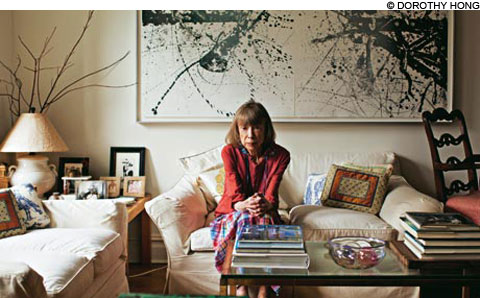
Joan Didion wore a purple scarf and her trademark oversized glasses last night at the sold-out Harvard Book Store-sponsored event at First Parish Church in Cambridge. She was in town to promote her new book, the heartbreaking “Blue Nights,” which concerns the death of her daughter and which can, and likely will, be read as a macabre follow-up to 2005’s deeply affecting “The Year of Magical Thinking,” about the death of her husband.
DOWNLOAD: Joan Didion interviewed by Chris Lydon, 2011 [mp3]
LISTEN:
The last few years have clearly weathered the famously precise writer, whose new book examines, in painfully raw, circular passages, her failings as a parent, her profound grief, and her own fading health.
“I hear a new tone when acquaintances ask how I am, a tone I have not before noticed and find increasingly distressing, even humiliating: these acquaintances seem as they ask impatient, half concerned, half querulous, as if no longer interested in the answer. As if all too aware that the answer will be a complaint. I determine to speak, if asked how I am, only positively. I frame the cheerful response. What I believe to be a cheerful response as I frame it emerges, as I hear it, more in the nature of a whine. Do not whine, I write on an index card. Do not complain. Work harder. Spend more time alone. I push-pin the index card to the corkboard on which I collect notes.”
Unflinchingly, Didion — who has always really been a journalist at heart, her curiosity her engine, her examinations of ’60s counterculture or Miami politics or Terry Schiavo reliably unflinching and often (mis)interpreted as cold — has become her own subject, creating a dark "portrait of the artist" in her twilight years. The book, in its repetitive logic, is a whirlpool; distressing and profound, even, in the way it asks question after terrible question: “What if I can never again locate the words that work?” she writes, every writer’s worst fear.
She has never been interested in comfort, but she is obsessed with truth. Perhaps, then, the strangest result of these last two deeply personal books is that she, in pulling the curtain back on death and dying in all its messiness, seems to have earned a new following, a stricken readership misunderstanding her rawness, her honesty, as an interest in the mass-produced memoir’s typical streamlined arc ending, inevitably, in healing and hope.
The moderator at last night’s event, Christopher Lydon, clearly aimed to fashion her losses into a story of buoyancy: Didion as the comeback kid. Tiny on stage, a little bewildered even, she politely took his compliments and resisted his agenda. “What would John [Didion’s deceased husband] say?” he asked oddly, at one point, regarding their daughter’s death and John’s Catholicism, wanting her to say something soothing, it seemed, about faith. She refused in what has obviously become her standard interview style: short, to the point; clarifying that John wasn’t devout, that he didn’t believe in anything.
Her own agenda, it seems, is more simple. “There is no difference in my mind between writing for myself and writing for the public,” she said a bit later. She is not creating an offering, then, so much as doing what she’s always done: documenting, investigating. Her new status — as was evident by question after question about grief and loss in the hallowed church — as saint of the bereaved, seems to make her uncomfortable. “I don’t want to write any more memoirs,” the 76-year-old writer said, regarding what she’s working on next. “I would like to discover something....The whole interest in writing is to discover something you didn’t know.”
















